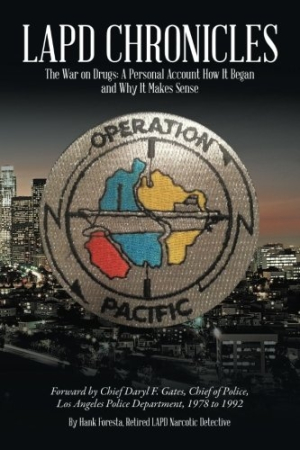LAPD Chronicles
The War on Drugs: A Personal Account How It Began and Why It Makes Sense
Natural-born storyteller Hank Foresta weaves together fascinating tales of police work, from unreasonable superiors to the war on drugs.
In LAPD Chronicles, Hank Foresta, a twenty-eight-year veteran of the Los Angeles Police Department, tells the story of his tenure, beginning in the volatile late 1960s and ending with his experiences as a narcotics detective. Relaying the many changes in both crime and policing he saw during that time, this is an intimate look at the world of big-city cops.
A natural-born storyteller, Foresta moves seamlessly from story to story, job to job, and year to year. His behind-the-scenes look at the beginnings and evolution of the national war on drugs is told in a conversational, fast-paced style. Attention never lags as the book moves from one case to the next. Each chapter heralds another story, another event in Foresta’s tenure.
It is fascinating to learn how policing has changed over the decades. In his first three years on the force, Foresta moved to three different divisions to earn the right to transfer to the job of his own choosing. He selects Metro Division, placing him squarely in the sights of a lieutenant with unreasonable demands. Once there, he is able to move into the Narcotics Division, where he spends the rest of his career. He rails against lenient judges, the politics of working with federal agencies, and many more issues that he sees as impediments to effective policing. He does not shy from giving his opinion about things he feels get in the way of making the city safe for everyone. The epilogue briefly traces the war on drugs from the first agents in 1915 to today’s honor roll of agents killed in the line of duty.
Because he lived them, his descriptions of the various events are exciting. He shares the tumultuous emotions that most every law enforcement officer experiences at one time or another. One chapter, for example, details a situation in which small stores in a particular area of Los Angeles were being robbed. Officers from the Metro Division were placed in stores to wait for the perpetrators. It ended with the death one of the robbers. “I wasn’t there, but it was a traumatic experience, just being part of the team. … It wasn’t a celebration of the kill; it was a celebration of success, of triumph, and of survival. … Defeat not only meant loss, it also meant death.”
There is clearly an editor at work here. While there are a few grammatical and spelling errors, they are not numerous enough to take away from enjoyment. Despite its considerable length, LAPD Chronicles is a quick read, due largely to Foresta’s easy-to-read writing style. This book will appeal to those interested in true-crime stories, the sociology and theory of drug use and the drug trade, and police procedurals, complete with strong opinions.
Reviewed by
Lynn Evarts
Disclosure: This article is not an endorsement, but a review. The publisher of this book provided free copies of the book and paid a small fee to have their book reviewed by a professional reviewer. Foreword Reviews and Clarion Reviews make no guarantee that the publisher will receive a positive review. Foreword Magazine, Inc. is disclosing this in accordance with the Federal Trade Commission’s 16 CFR, Part 255.

